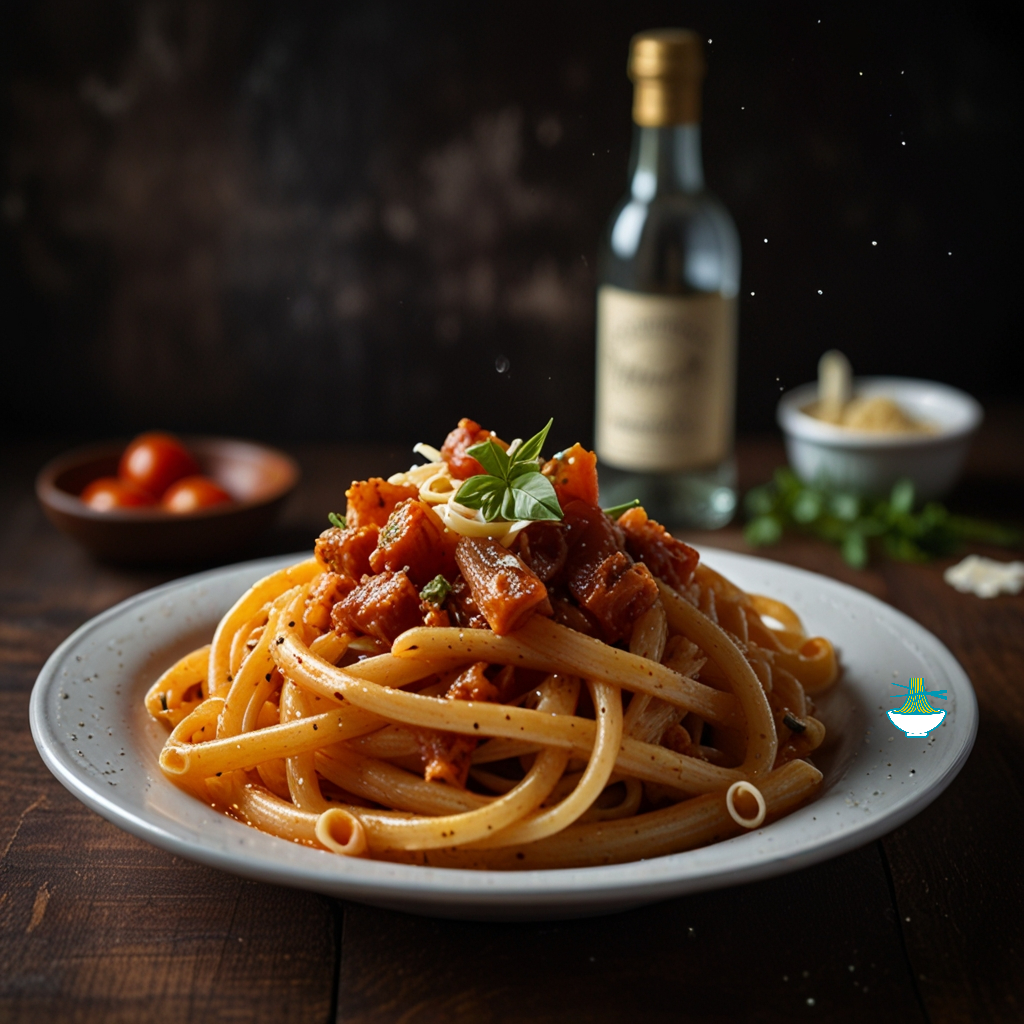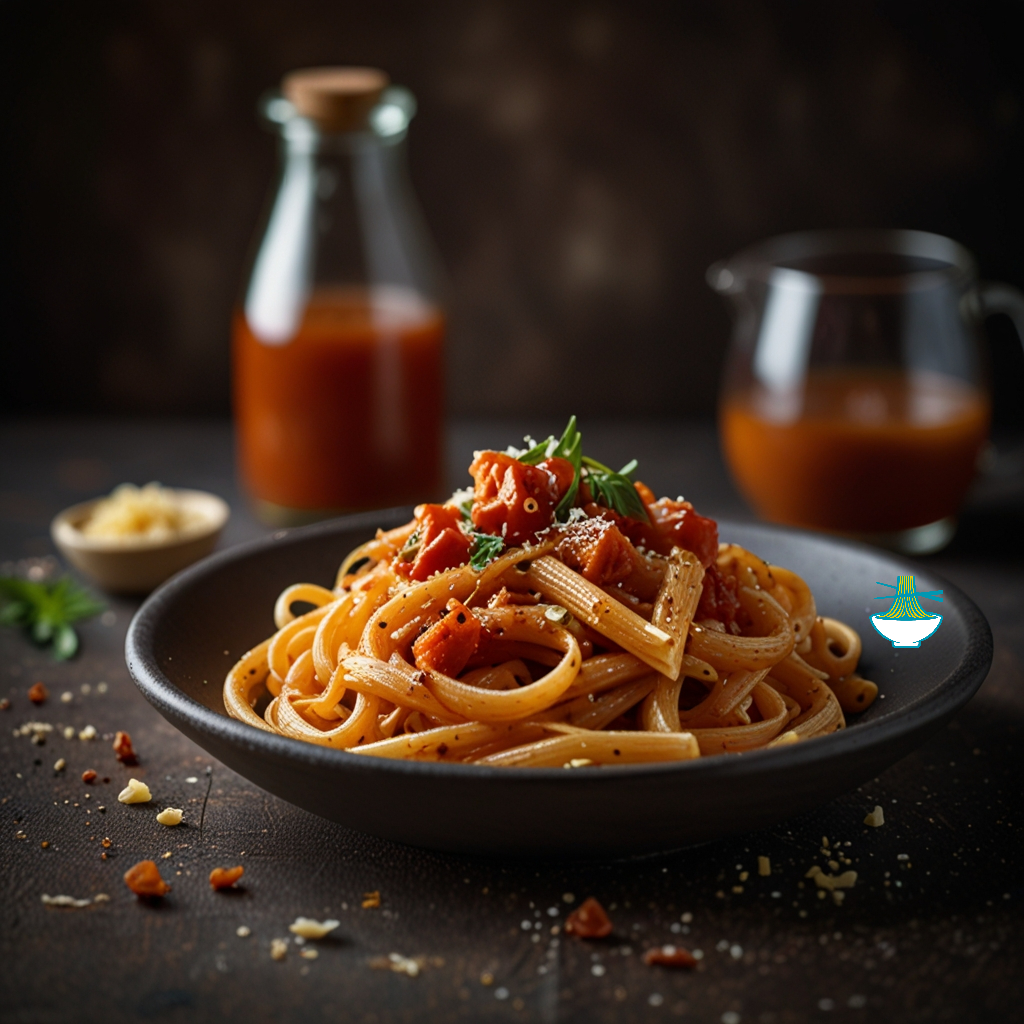Bucatini all'Amatriciana is a classic Italian pasta dish featuring bucatini noodles topped with a savory sauce made from tomatoes, guanciale or pancetta, Pecorino Romano cheese, and chili flakes. Originating from the town of Amatrice in the Lazio region of Italy, this dish has a rich history dating back to the 18th century. Traditionally, it was enjoyed by shepherds in the region, but it has since become a beloved staple in Italian cuisine, known for its bold flavors and simple preparation. Today, Bucatini all'Amatriciana remains a favorite among pasta enthusiasts worldwide, cherished for its authentic taste and cultural significance.
Ingredients:
- 320g bucatini pasta
- 150g guanciale or pancetta, diced
- 400g canned tomatoes, crushed
- 50g Pecorino Romano cheese, grated
- 1/2 teaspoon chili flakes
- Salt, to taste
- Olive oil
Method:
1. Heat a drizzle of olive oil in a large skillet over medium heat. Add diced guanciale or pancetta and cook until golden and crispy.
2. Remove excess fat from the skillet, leaving about 1 tablespoon. Add chili flakes and cook briefly.
3. Pour in crushed tomatoes, season with salt, and simmer for about 10-15 minutes until the sauce thickens slightly.
4. Meanwhile, cook bucatini pasta in a large pot of boiling salted water according to package instructions until al dente. Drain, reserving a cup of pasta water.
5. Add cooked pasta to the skillet with the sauce, tossing to coat evenly. If the sauce seems too thick, add a splash of reserved pasta water.
6. Remove from heat, sprinkle grated Pecorino Romano cheese over the pasta, and toss once more.
7. Serve immediately, garnished with extra cheese and chili flakes if desired. Enjoy your delicious Bucatini all'Amatriciana!
Nutrition Value:
1. Bucatini Pasta (320g):
- Calories: Approximately 320 kcal
- Carbohydrates: Around 64g
- Protein: About 12g
- Fat: Minimal, about 1g
- Sodium: Low, around 5-10mg
- Cholesterol: None
- Vitamins & Minerals: Contains some B vitamins and traces of iron
- Nutritional Benefit: Provides energy from complex carbohydrates, a moderate amount of protein, and some essential B vitamins and minerals.
2. Guanciale or Pancetta (150g):
- Calories: Approximately 450-500 kcal
- Carbohydrates: Minimal, about 1-2g
- Protein: Around 20-25g
- Fat: High, primarily saturated fat, around 40-45g
- Sodium: Varies, but can be high, approximately 500-600mg
- Cholesterol: High, around 50-70mg
- Vitamins & Minerals: Contains small amounts of B vitamins and minerals like iron and zinc
- Nutritional Benefit: Provides protein and fat for energy, but should be consumed in moderation due to its high saturated fat and cholesterol content.
3. Canned Tomatoes, Crushed (400g):
- Calories: Approximately 80-100 kcal
- Carbohydrates: Around 15-20g
- Protein: About 3-4g
- Fat: Minimal, about 0-1g
- Sodium: Varies, but typically moderate, around 200-300mg
- Cholesterol: None
- Vitamins & Minerals: High in vitamin C, vitamin A, potassium, and other antioxidants like lycopene
- Nutritional Benefit: Provides vitamins, minerals, and antioxidants, especially vitamin C and lycopene, which may have various health benefits, including reducing the risk of certain diseases.
4. Pecorino Romano Cheese (50g):
- Calories: Approximately 160-200 kcal
- Carbohydrates: Minimal, around 1-2g
- Protein: Around 10-12g
- Fat: High, primarily saturated fat, about 12-15g
- Sodium: Moderate to high, approximately 300-400mg
- Cholesterol: High, around 40-50mg
- Vitamins & Minerals: Good source of calcium and phosphorus, also contains vitamin A and B vitamins in small amounts
- Nutritional Benefit: Provides protein, calcium, and other minerals, but like other cheeses, it's high in saturated fat and cholesterol.
5. Chili Flakes (1/2 teaspoon):
- Calories: Negligible
- Carbohydrates: Negligible
- Protein: Negligible
- Fat: Negligible
- Sodium: Minimal, but can vary
- Cholesterol: None
- Vitamins & Minerals: Contains small amounts of vitamins A and C, and capsaicin, which may have health benefits.
- Nutritional Benefit: Adds flavor and a spicy kick to the dish, along with potential health benefits from capsaicin.
6. Salt:
- Calories: None
- Carbohydrates: None
- Protein: None
- Fat: None
- Sodium: Varies depending on usage
- Cholesterol: None
- Vitamins & Minerals: None
- Nutritional Benefit: Enhances flavor, but should be used in moderation due to its sodium content.
7. Olive Oil:
- Calories: Approximately 120-130 kcal per tablespoon
- Carbohydrates: None
- Protein: None
- Fat: High, primarily monounsaturated fat, about 14g per tablespoon
- Sodium: None
- Cholesterol: None
- Vitamins & Minerals: Contains vitamin E and small amounts of vitamin K
- Nutritional Benefit: Provides healthy fats, especially monounsaturated fats, which may have various health benefits, including reducing the risk of heart disease. It also adds flavor and richness to the dish.


Comments